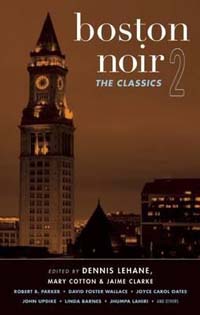 Boston Noir 2: The Classics
Boston Noir 2: The Classics
Edited by Dennis Lehane, Mary Cotton & Jaime Clarke
Akashic Books, 2012
288 pages / Paperback $15.95; Hardcover $24.95
Buy from Akashic Books or Amazon
I dare you to find a better time to revisit noir. Exit-strategying the Middle East, clawing out of near-Depression, facing post-war fears of foreign threats, the parallels to the Fifties bares a bright opportunity to revisit its definitive form of American Escapism. And if there was a book to revisit this escapism, it’s Akashic’s new Boston Noir 2: The Classics.
Since 2004, Akashic has been producing original noir anthologies set in specific cities—Brooklyn, Baghdad, San Francisco, St. Petersburg. Dennis Lehane (Gone, Baby, Gone, Shutter Island, Mystic River) returns to co-edit along with Mary Cotton and Jaime Clarke (Post Road Magazine, No Near Exit) to bring a decadent compilation of stories and novel excerpts that open the noir genre with a rib-spreader and poke it with a knife.
Several books in the long-running series are subtitled: The Classics. Unlike sequels, these books serve as post-prequels, uncovering origins while mapping evolution. The objective is clearly summed up by the editors in the introduction:
“Noir alludes to crime, sure, but it also evokes bleak elements, danger, tragedy, sleaze, all of which is best represented by its root French definition: black.”
And so, this collection, “The Classics” seems to nod at the core etymology of the form. It exhibits story beyond the expectations of, as the editors deem, “men in fedoras smoking cigarettes on street corners.” Instead, it boils down expectation to root-human depravity. It exposes the breadth and width of our capacity to do horrific, dark and “deeply unsettling” things. In other words, it violates our expectations, as good noir should. Violations of self, of the American Dream, of hope and prosperity, this anthology sledgehammers it, puts a lit firecracker into the mouths of the characters just to see what might happen. While these violations of noir are particularly heightened in Part Three’s Voyeurs & Outsiders, the editors do not fail to explore the full capacity of “classic,” including work from Andre Dubus, David Foster Wallace and Joyce Carol Oates. “Lucky Penny” by Linda Barnes, in Part Two’s: Criminal Minds, taps into the voice-vein of narrators from the pages of James M. Cain, yet pushes outside the constraints of hardboiled fiction and noir, giving the keys to the male detective engine to a female cab driver/ex cop as she searches for her jacked $4.82 fare in change, one coin of which holds deadly significance. In Part One’s Broken Families, we are welcomed into the bleakness of “home,” breaching our definitions of safety and security. In the opening story, “The Marriage Privilege” by Chuck Hogan, we are given legal loopholes manipulated for financial gain, yet set within our modern struggle to define marriage; and so, the loophole takes on new meaning. In Robert B. Parker’s “Surrogate,” a warped infringement upon the classic noir device masculinity-versus-emasculation pivots on a perverse and stark marital, or ex-marital, dispute of vulnerability, desperation, and, perhaps, bottom-barrel scrapings of love and longing. Yet, we can’t overlook “Surrogate’s” classic noir innuendos, especialy the moment when Northrup’s ex-wife, Brenda, spews at him, and with plenty of vindictive and justified reason, hinting at his impotency during their marriage: “What you wanted, ‘North,’ was total possession.”
Boston Noir 2: The Classics is a thorough representation of what noir has been, is, and continues to become. In the opening pages, we see a map of Boston marked with the stories’ inhabitations, chalk-outlined, as if preparing us for the blackness ahead. The book’s cover portrays Boston’s baroque Custom House Tower at night, lit in classic chiaroscuro light and shadow, filtered with a color like that of dried blood. The shadows over Boston are those of Bogart, leaning into the spotlight with that complexity of soul, that derisive navigation of morality and deviance, lifting the edges of his mouth into a sinister grin. The shadows on this cover prepare the tone, that these thin darknesses can be willed into corruption with little effort, and the reader will learn the ease of giving into it.
***
Zachary Tyler Vickers is a graduate of the Iowa Writers’ Workshop where he was the Provost’s Fellow. He has appeared in KGB Bar Lit Journal, Waccamaw, H_NGM_N, Hobart, and is the recipient of the Richard Yates Prize and the Clark Fisher Ansley Prize. In 2012, he was a finalist for the Evans Harrington Grant for his literary noir novel-in-progress. He currently teaches at the University of Iowa.
Tags: akashic books, Boston Noir 2, Dennis Lehane, Jaime Clarke, Mary Cotton, Zachary Tyler Vickers

Super smart review! Love this book.